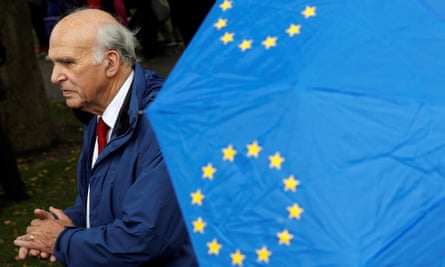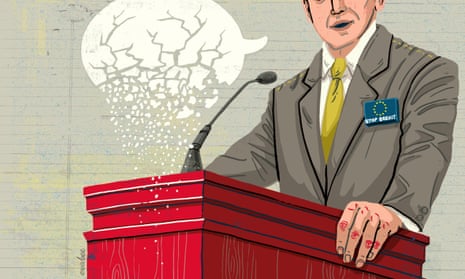If only Brexit would go away. It sucks the political oxygen away from the issues we should all be discussing: like low wages, insecure jobs and the housing crisis. It is a rallying cry for a noxious alliance of anti-immigrant demagogues and regulation-stripping free marketeers. The bigotry, xenophobia and racism stirred up by the official leave campaigns injected an ugliness into British politics which never dissipated, and left hate crimes surging. And, frankly, Brexit is just mind-numbingly, painfully, excruciatingly dull. So yes, if there was a big red button to make it all just go away, I’d enthusiastically push it.
Yes, as a socialist, I had profound reservations about the current incarnation of the EU, and even considered the case for leave. I dismissed the argument because of persuasive pleas from European leftists to stand together to reform and change the EU, and because it was clear that a hellish anti-immigration crusade beckoned. And so, alongside the Another Europe Is Possible alliance, I passionately campaigned against the Brexit juggernaut. Then the vote happened, and we lost. There seemed to be two conclusions that fateful night. One, challenge the bigotry, authoritarianism and intolerance of the Tory Brexiteers. And two, try to reconcile a bad result with the country’s future.
Which brings me to the “stop Brexit” campaign. Many decent and honest people are committed to reversing the referendum result. They fear a completely unnecessary national tragedy is befalling Britain, driven by myths and lies, and believe economic turmoil and national isolation await. It is perfectly legitimate to seek to democratically challenge a referendum result. But it is difficult to see how the current strategy, communication and leadership of this cause achieve anything other than doom it to failure.
First off, I’m not convinced by the campaign’s aim, and here’s why. Some stop Brexiters recite, almost as a mantra, that the referendum was only advisory (despite the government sending a pamphlet to every household in Britain promising them that the government “will implement what you decide”). If the referendum result was simply cancelled, it would be regarded as a coup against democracy not just by leave voters, but by many remainers. Faith in democracy may never be rebuilt – “more people voted for Brexit than for anything else in British history and the establishment thwarted it”, the refrain would go. It would surely be the greatest shot in the arm for the radical right in British history – not least because the result was in part due to a sense of resentment against a contemptuous political elite.

Alternatively, a second referendum could easily be framed as the establishment holding votes until it got the right result. It would mean an even more bitter campaign than the last, leaving deeper national divisions than ever. Either the last result would be reconfirmed, with rightwing Brexiteers more triumphalist and intolerant than ever; or – if remain scraped a narrow victory – furious Brexiteer demands for yet another referendum would be impossible to resist. Would it be best of three? Furthermore, a focus on overturning the referendum surely risks abandoning the debate over what sort of Brexit deal Britain negotiates to the Tory extremists.
Then there’s simple political maths. If Labour committed to overturning Brexit, the party would haemorrhage many of the 3 million or so of its voters who backed leave, losing seats as a consequence. Perhaps it would win a sliver of the 7% of Britons currently supporting the main stop Brexit party, the Liberal Democrats: though even that paltry gain would be in urban remain seats already held by Labour. Indeed, if preventing Brexit is such an inherently appealing prospect, why the derisory level of support for Vince Cable’s party? The consequence would surely be a decisive Conservative electoral victory, enabling the party to implement the most true blue of Tory Brexit deals, and continue everything from austerity to the failure to build affordable homes.
I’m genuinely open to having these arguments rebutted by stop Brexiters: actually, I’d like to be persuaded. But their campaign seems unable to learn from the failures of the official remain movement in the referendum, which was seen by many as an establishment push for the status quo in an era when millions feel angry and disillusioned.
Its prominent spokespeople – Tony Blair, Nick Clegg and unelected peers – simply cement the negative images of what was, after all, a failed campaign, however unfair that might seem to the most devout supporters. A successful movement would have to win over a significant chunk of leave voters, and remainers resigned to the vote. But leavers are often dismissed en masse as racist and ignorant – which, again, does little but confirm their views. Even remainers who believe the vote has to be accepted – and polling suggests there are millions – are beyond the pale to the most committed stop Brexiters.
To have any chance of success, they need a completely different strategy. First, the messenger matters, not just the message. For many leave voters, a thwarted Brexit would be an establishment coup against the democratic will of the people. Having discredited and deeply unpopular politicians, or unelected peers, pushing for this surely reinforces these views. Second, if stop Brexit presents itself as a defence of the status quo – at a time of popular ferment – it will fail: it should combine its signature policy with radical demands.
Third, it should launch itself as a grassroots, populist insurgency: rather than hosting EU flag-waving marches in remain citadels, it should hold mass public meetings and leafleting campaigns in leave areas, focusing on a positive case directed at those who are not enamoured with the EU (which is most people, including many remain voters). Its aim should be to shift public opinion so dramatically that calls for a new referendum become unanswerable.
Instead, it seems that too many stop Brexiters are making the same mistakes some leftists have traditionally made: looking for traitors, not converts; defined by what they are against, not what they are for; purist; cult-like; treating the wider public as politically backward; angrily dogmatic; yelling at people on Twitter.
No, I’m not convinced by their case as things stand, and can’t see clear answers to the questions I pose. A Labour-managed Brexit that doesn’t shred our links with the EU and turn Britain into a low-regulation tax haven still seems preferable. But the case to stop Brexit does deserve to be made, and deserves to be made well.

